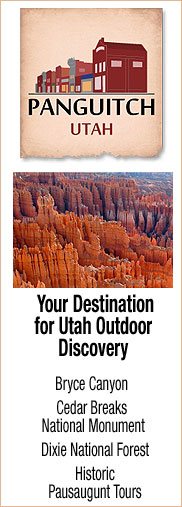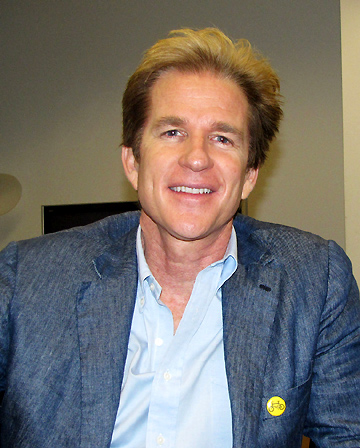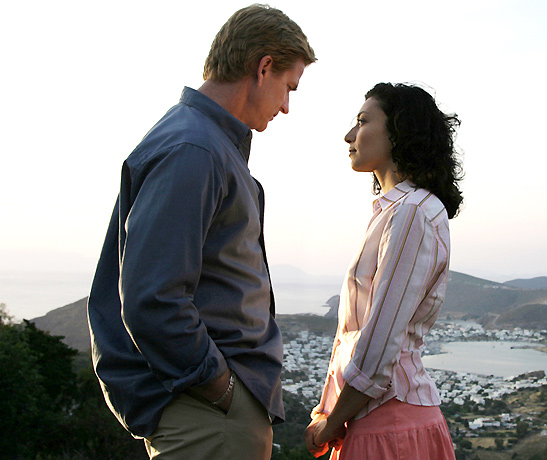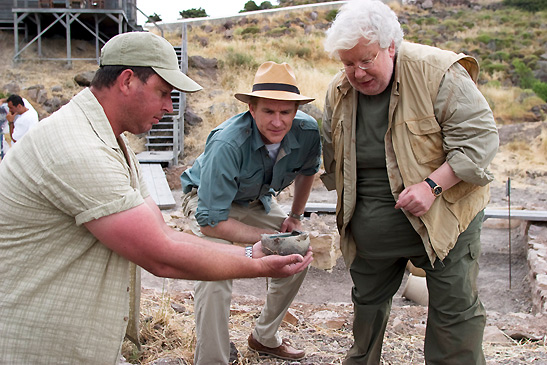 |
 |
|
 |

|
Life and Times With
Modine recently appeared at a press conference to promote his newest film, OPA! that takes place on a Greek island. The story, although somewhat predictable, is sweet with a “happy ever after” resolution. However, Modine didn’t just talk about his film, as he also expressed universal concerns outside of the sheltered, glamorous world of entertainment. Text has been edited for print purposes. Bev: Matthew, what do you love most about your work?
Modine: What’s interesting about my job is the opportunity to meet people and to travel. People who are successful in making films or writing scripts are generally interesting and smart, and it’s a pleasure to be around people who are passionate about what they do, which is story telling. I had an experience recently in Turkey in which I stood in an amphitheater carved into the side of a mountain that was probably built by slaves over 2,200 years ago and here was still standing. I sat there imagining people singing songs and dancing and telling tales and thought that this is what I’m part of – part of the legacy of story telling. It was quite humbling.
Bev: How do you think film and theatre affects popular opinion?
Modine: As far as illuminating the human condition, at its best our profession, the movie business or theatre, provides the opportunity of shining light into what could be a frightening space, making us realize that there is nothing to be afraid of and that we’re all brothers and sisters. If the Palestinians and the Israelis would come to that realization, that could be the first step in ending the stupidity of hatred and violence that exists there. Bev: What attracted you to OPA!?
Modine: Traveling to Patmos was an opportunity of reinforcing the idea of brotherhood. I play an uptight archaeologist named Eric who comes to this Greek island in search of a buried treasure and falls in love with Katerina (Agni Scott), the owner of the popular Taverna. He discovers that this historic treasure is buried under her property, which then creates a moral dilemma. The story contrasts my character, Eric, who is materialistic, against the people who live there, who are spiritual. Bev: What is the lesson he learns? Modine: They teach him that what is important in life is not the cup that Saint John the Devine drank from; it was the person who drank from it and what’s important are the people who live there and the joy that comes from the Taverna – a place where people gather to sing and dance, occasionally break dishes, and take care of each other. It’s materialism vs. spirituality vs. living. Bev: How does this view translate to the West? Modine: For people losing their homes, it’s an important lesson. Our possessions are just things. What’s great is when there’s a natural disaster such as hurricane or tornado, people come together to help each other. In the final moments of our lives, we’re not going to be dying thinking about our houses or our cars. We’re going to be thinking about the people we loved and did we try to make the world a better place. That’s what we’ll be remembered for. Bev: How did Katrina change Eric?
Modine: When Eric arrives on the island, he’s all covered up with hats and jackets and doesn’t even see the ocean. He’s like a seed that Katrina waters with her love and watches him grow. She gets him to let go and experience life – OPA!, which is a difficult word to translate because it means so many different things. It’s like La Chaim – to life. Bev: What is the main thing difference you’ve discovered in eastern and western cultures? Modine: When you travel to a country with an old culture they seem to appreciate life because they understand the brevity of it in a way we don’t because we’re a young country. They’re surrounded by antiquities going back thousands of years while here in a Los Angeles, we’re surrounded by buildings that are 100 – 150 years old. Bev: So is the message of the movie to respect the past? Modine: You want to respect the past, but you don’t want to be held to the past if it doesn’t hold empirical truth to life in the present; that’s the beauty of the yin and the yang of the conservative and the liberal. The one thing we know about life is that when we wake up tomorrow, the world will be different, you will be different, your body will be changed; you’re dying. If you embrace it, it’s kind of exciting. Bev: What are the major problems we face? Modine: The problems we face are enormous - environmental and wars. This is not a time when people beat each other in the heads with shovels, or spears, or bows and arrows. We live in a time when someone can make a nuclear bomb compromising everyone’s life on the planet. With the understanding of DNA, we are all brothers and sisters scattered around the globe. Our natural resources are getting exhausted. Even if we said let’s build more nuclear power plants, you know there’s only a finite amount of uranium available just as there’s only a finite amount of oil and coal which might last for another 50 to 100 years. What we need to understand is that everybody who’s ever existed, existed here on this little blue ball, and there’s nobody coming to save us – we have to save ourselves. Bev: Were there any special challenges to combing a successful career with that of being husband and father? Modine: Relationships are very complicated and I would never stand in judgment of anyone. It’s hard for two people to grow old together. What I value is what I learned at young age and that was how important it is to tell the truth. It would be soul-destroying for me to be someone who would cheat on his wife after making a promise to her. I couldn’t live with myself. Bev: Do you think living away from Hollywood has helped your 30-year marriage to Cari? Modine: Yes. I think so. But, it was really difficult and a lot of work because my profession takes me away so often. But, we rely so much on each other. She gave me two beautiful children and she is the most unbelievably selfless mother. I grew so much to appreciate and love her and still thank her monthly for giving me these two children and doing such a great job of raising them. I once read that that the best gift a father could give to his children is to love his wife. Bev: Do you have any fears as an actor? Modine: Every time you finish a job you wonder if you’re going to work again. Bev: What kind of impact does a bad review have you? (Indirectly referencing the poorly received Matthew Modine Saves the Alpacas) Modine: I try not to read them because someone told me that if you read the good ones you have to read the bad ones as well because if they say something good and you believe it, then you going to have to read the bad ones and believe those as well. I don’t want to be not influenced one way or the other. It’s easy to lose your confidence if a critic hates your performance. Bev: What drew you to Matthew Modine Saves the Alpacas? Modine: A friend of mine wrote it, but my son didn’t like it, as he didn’t think it depicted me in the best light. I tried to explain to my son that it wasn’t me and that I didn’t spend 20 years smoking dope in a Winnebago or that I’m a selfish shallow person who’s willing to adopt a baby in order to get back on the “A” list. I explained that this was a story about a character named Matthew Modine and that using my name was a way of making fun of this business we call “show.” Originally, my friend wanted to write something serious about the motion picture industry – about the objectification of women, about how women are treated like meat - tits and ass – then discarded when they reach a certain age. Bev: What made him change direction: Modine: As he was getting deeper and deeper into it, I think he faced the same problems that Stanley Kubrick faced with Dr. Strangelove. The more he tried to write about it in a serious way, the more absurd it became and that the only way to approach it was in a comedic, farcical way. So Blair (writer) found he could have more fun with the play if he made fun of it, which is why he used my name in my title. Bev: Getting back to OPA! Were there any special challenges shooting in Greece? Modine: The only challenge was getting there as it’s pretty remote and is actually closer to Turkey than to Athens. Bev: Was your leading lady (Agni Scott) fun to work with? Modine: Yeah. She was great. Christina Concetta, who co-wrote the screenplay with our director Udayan Prasad, realized after filming for one day that she could not play the part and that’s when Agni jumped in the next day without any rehearsal. Bev: Did the nude scene in the sea offer a challenge? Modine: Udayan is from India, living in England and Greece, and swimming around naked is just part of life so if I would have protested, they would have thought that I was a big sissy. What I’ve been told, is that originally you see my penis in the film so in order to get a PG-13 rating, they digitally removed my tallywacker. They call it a mangina. Bev: What do you think of social networking? Modine: I think social networking is an interesting phenomenon. I think it magnifies the separation in our lives. I live in New York City and we’re much more in contact with each other because we’re cold together, we’re hot together, we travel on the train together. There’s a connection just because of our close proximity to each other. Here in Los Angeles, there’s all this separation - you leave the house, get into the car, drive to the building, etc., and you don’t come in contact with people so I think the social networking is a real example of how people want to connect. Bev: What’s next for you? Modine: I don’t know. I’m facing that right now. But, the exciting thing is that I recently finished doing To Kill A Mockingbird at the Hartford stage and it was the most successful play in the history of that theatre. It’s much more fun getting standing ovations playing Atticus Finch than playing in Matthew Modine Saves the Alpacas. Comedy is brutally hard. You never know what the audience is going to laugh at. It’s like heroin getting people to laugh – it’s very addictive. Bev: Did you grow up being a Mormon? Modine: My dad was a drive-in theatre manager and joined the Mormon Church when we moved to Utah because his mom told him it would be beneficial to the family. The Mormon church won’t let go of me thanks to Wixpedia. (laughter) Bev: Thank you. This has have been a pleasure. Modine: Thank you for your time. |
|
Thanks so much for those lovely tourism photos, especially of Ireland. I certainly enjoyed all the places you suggested, and am working towards my next vacation. Don’t forget Cuba. That’s an exciting place. Rosalie, Los Angeles
Enjoyed your article on Mira Sorvino. Such an interesting background – family, education, career and now human rights activist. I'm not a gossip mag fan so getting more meaty news about movie celebrities from you gives me hope that there are some inteligent life forms in Hollywood. Peter Paul, Pasadena, CA
Thank you, Bev. This reminded me to go see the movie, "An Education," which I had already almost forgotten about, having seen the preview a few weeks ago. I enjoy this actress quite a bit--she has a uniqueness about her and she pulls me in. I enjoyed this. Sandeee, Seattle, WA
Thank you Beverly,I really enjoyed reading about your intimate conversation with Forest, of whom I am a great admirer. I look forward to seeing the film "Our Family Wedding." Yoka, Westlake Village, CA
Thank you for the sending me the beautiful article you wrote about Ireland. We will use your recomendations for hotels in the Southern part. We plan to also go to Dublin and some other Northern cities so I will get some recommendations for these from others. After reading your article, I am getting more excited about going. I think we will be in Ireland for 8 days altogether. Leah Mendelsohn, Santa Monica, CA
Very much enjoyed Ms. Cohn's article about Munich, especially the visuals. Though it has been 25 years since my last visit, the piece brought back countless pleasant memories of the city and the people!! Many thanks. Lawrence, Los Angeles * * * Marianplatz and that general area is truly one of the best Christmas celebrations in the world. Between that and Oktoberfest (which I can only imagine) Munich is one of the greatest cities in the world for major annual events. Christopher Dale, New York, NY
Hi Bev, you have done some wonderful pieces on some great celebs...Great work. The travel articles are just wonderful too. Scott Mueller, Huntington Beach, CA
Your great Zurich article makes me want to go there for the holidays! I love the photos, too, especially the ones of you in the sleigh, the view over the houses and the zoo! Anna Marie, Santa Monica, CA * * * Lovely article! As a European, and having been to Zurich (albeit in summer) I can vouch for this lovely city. Great pictures, too! Helene Robins, Santa Monica, CA
Hi Bev, Nice review, nice seeing you, nice website interface "...Talk to Bev" - Enjoy your Thanksgiving! Richard D. Kaye, Marina del Rey, CA
Hi Bev, Your interview with John Cusack is very interesting. I always wondered why these actors/actresses always get top billing when really, if you think about it, the real work come from the animators, writers and tech whizzes who spend far more hours on the movie than those actors. I know, I know, it's the all about marketing. The names of these actors are what bring in the big bucks. Still, I think these actors are way overpaid for the "little" that they do. I remember that once upon a time, the early animation classics never mentioned the voices behind the characters. I think it was only later when Walt Disney tapped into the voices of known celebrities like Walter Matthau in the Jungle Book or Zsa Zsa Gabor in The Rescuers that the voices became a marketing magnet. Keep up the good work. I enjoy your interviews as you peer into the lives of the Hollywood celebrities. Peter Paul of South Pasadena, CA
|
This site is designed and maintained by WYNK Marketing. Send all technical issues to: support@wynkmarketing.com
|

|


















